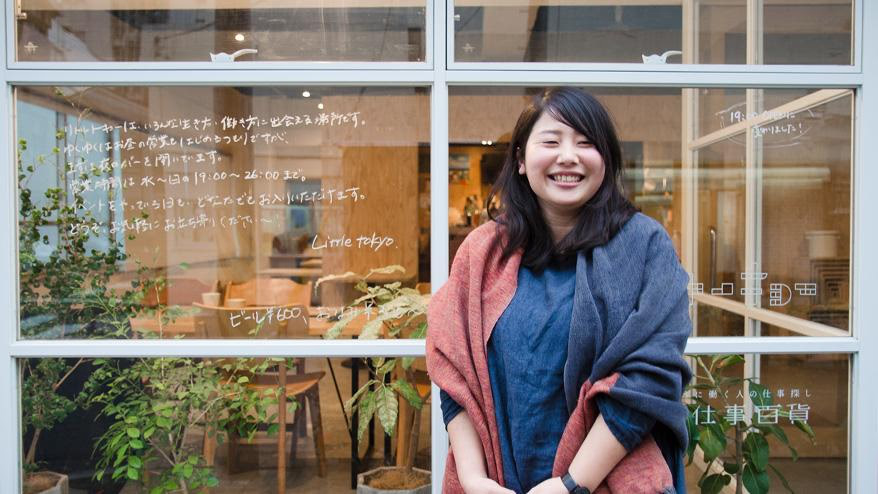モノサスの人材募集の窓口として、何度もお世話になっている日本仕事百貨。そこで、モノサスで働く私たちよりもモノサスのことをわかっているんじゃないかな?というすばらしい仕事紹介記事を書いてくださっているのが、中嶋希実さんです。
(インタビュー構成:佐口賢作)
会った人みんなをほんわかした気持ちにさせて、気づいたらいつも以上にたくさんのことを話してしまっている……。中嶋さんは、どんなことを考え、どんなふうに働き、その不思議な磁力を手に入れたのか。気になってしまい、めぐるモノサシに出てください、とお願いしました。
-
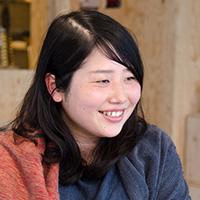
-
中嶋希実さんプロフィール:
1985年生まれ、茨城・取手育ち、龍ケ崎在住。川沿いの実家から50歩の家で暮らしながら、東京と茨城を行ったり来たり。生きるように働く人の仕事探し「日本仕事百貨」、いろんな生き方働き方にであう場所「リトルトーキョー」の運営。地元・取手で活動する取手アートプロジェクトでは「あしたの郊外」と「取手アート不動産」の運営。年に1回、start to [ ] の活動でバングラデシュへ。最近チャイ屋「きみちゃい」をはじめました。
国際協力に興味を持ち、ベトナム語を学び、活動的なニートを経て、気づくと日本で二足のわらじを履いていた
「私、別に書き手になりたかったわけではないし、今も正確にはライターじゃないんですよ。日本仕事百貨には、取材・編集・原稿作成のみを担当しているライター陣がいて、私のメインの仕事は総務的なことや全体のマネジメント。書く仕事は全体の3割くらいなんです。だから、すいません。いきなり今回の主旨から外れる感じで (笑)」
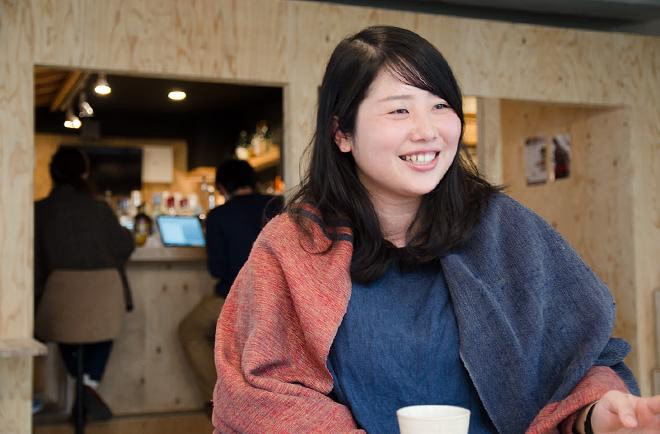
“生きるように働く人の仕事探し”をキャッチコピーに、多くの読者とファンを持つ異色の求人サイト「日本仕事百貨」。モノサスでも何度もお世話になり、その際に『ともはた※』のことも神山のことも見事につかんでモノサスの想いを原稿にまとめてくださったのが、日本仕事百貨の中嶋さんでした。
※ともはた=「ともに生きていきたい人たちとはたらく」の略。
代表の林をはじめ、モノサスでよく語られるキーワードのひとつ。
ところが、いきなりの「ライターじゃないんです」宣言。ちょっとびっくりしつつ始まったインタビューは、日本仕事百貨に加わる前の中嶋さんについてうかがいながら進んでいきました。
「中高時代、アフリカに親近感を覚えるようになって、ニュースも気になっていって。高校生ながらに貧困の問題に興味を持って、大学ではもっと知りたいと思ったんです」
国際協力や発展途上国のことを勉強できる学部を志望した中嶋さん。大学ではベトナム語を専攻し、国際協力について4年間学びます。そこで気づいたのは、「日本の生活は楽しいし、すべてを捧げるようにして現地に入って何かをやりたいわけではない」ということでした。
迎えた就活では、「ホワイトバンドプロジェクトが流行っていた年で、こういう形の協力の仕方もあるんだな」と思い、Web制作、企画キャンペーンを行う企業に就職。営業を担当しながら、「ゆくゆくは NPO の活動を販売促進の面から手伝えるようなことをしたい」と考えていたそうです。
「結局、4年半勤めたんですけど、転職したいところができて、その会社のサイトを見たら『今、日本仕事百貨で募集しています』と書いてあったんですね」
その会社への転職は叶わなかったものの、「日本仕事百貨はおもしろいサイト」と感じた中嶋さん。「当時、会社での仕事が嫌になっていた部分もあって。こんなふうに前向きに、健やかに働いている人たちがいるんだな」という刺激を受け、一読者となっていったそうです。
その後、会社を辞めるまでのあいだ「興味のあるイベントにどんどん顔を出す」キャンペーンに取り組んだ中嶋さん。Webマガジン「greenz.jp」が主催するイベントやスクールに参加。そこで、登壇者やゲスト講師として現場に来た日本仕事百貨代表のナカムラケンタさんと出会います。
「最初は『仕事百貨の人だ……』というくらいの感覚だったんですが、ちょうど日本仕事百貨でインターンを募集していて。『社会人もありです』と書いてあったので、『ここでインターンをしたらおもしろい転職先がみつかるかも!』と応募しました」
雑談のような面接を受け、後日「今度、イベントがあるので手伝ってください」という連絡が入り、「なんとなく始まった」というインターン。会社をやめた後のニート期間、週に1、2回の頻度で事務所に行き、取材の音声データの書き起こしや取材同行、イベントの手伝いなどを行っていたそうです。
「じつは同時期に地元・茨城県の取手市にある、アートと街づくりのNPO※でもボランティアをしていたんです。別にアートとか街づくりにすごい興味があったわけではないんだけど、そこにいる人たちも日本仕事百貨にいる人たちと同じくおもしろかったんですよ」
※「アートのある団地」や「半農半芸」を運営するNPO「取手アートプロジェクト(TAP)」
そこでの活動を伝える、greenz.jp による中嶋さんへのインタビュー記事はこちら
失業保険の期間が終わる頃、ナカムラさんから「ちゃんと入る?」と誘われる一方、取手のNPOでも3年単位の助成金を受けてプロジェクトを立ち上げることになり、「契約を結んで担当してくれないか」と声がかかりました。
「偶然、両方でお金がもらえるようになったタイミングが重なったんですよ。私としては、このままうまくいけば両方のおもしろい人たちとの付き合いが続くなと思って。どちらかを辞めて別の仕事をしても、友だちとしての関係は続くかもしれないけど、友だちとしての関係と仕事をしている関係ってまた違うじゃないですか。
できれば、この人たちともうちょっと仕事という関係を続けていけたら楽しそうだなって思ったんですね。それで、二足のわらじが始まりました」
週3日は日本仕事百貨、残り時間を取手のNPOというバランスは、助成金の期間が終了するまで3年続きました。そして、徐々に日本仕事百貨に軸を移し、関わり方も個人事業主からパートタイマーとなり、現在は正社員に。ただし、在宅での仕事を認めてもらい、地元で過ごす時間も大切にされているそうです。
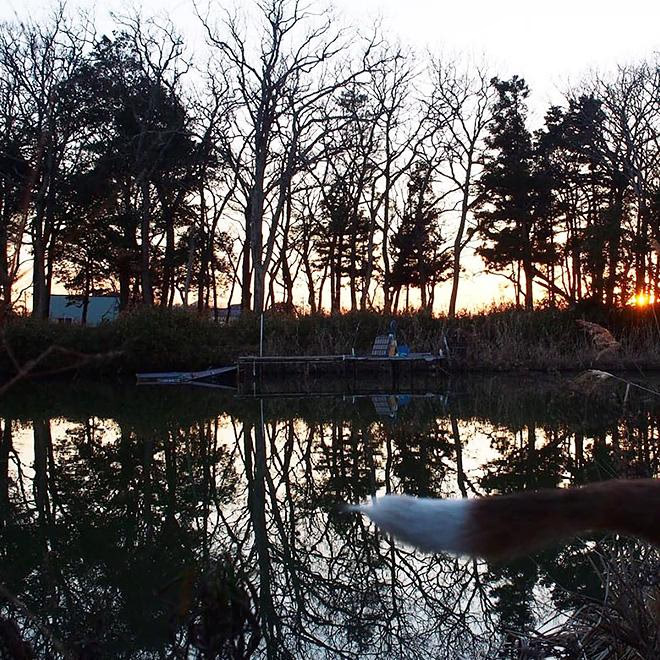
中嶋さんのご近所の風景。自宅でのお仕事の合間に、こんな景色の中を 愛犬と散歩されたりしているとか。
中嶋さんが関わっているTAPの取り組み
(写真提供:取手アートプロジェクト)
- 「アートのある団地」
多様な背景・価値観を持つ人びとの生活が集まっている団地をプロジェクトサイトとして、日常生活の中で住民とアーティストが関わりながら生み出す新たな「営み」を通じて、郊外都市であるからこそ見出せる新しい表現、新たな価値観の可能性を拓こうとしています。
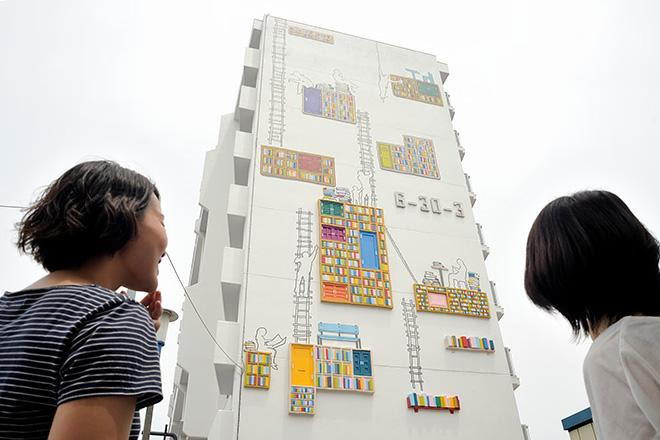
戸頭団地に壁画アートをほどこす「IN MY GARDEN」というプロジェクト。住民から寄せられた戸頭団地の思い出やエピソードをもとに、アーティスト上原耕生さんが構想や空想を広げ、戸頭団地の壁面をキャンバスに見立て、居住空間をアート作品化した。(写真撮影:伊藤友二)

(左)井野団地の住民たち自身が運営する宿泊型アートイベント「サンセルフホテル」の様子
(右)サンセルフホテルの宿泊者が、ソーラーワゴンを持って宿泊に使う電力を蓄電しながら周辺を散策(写真撮影:伊藤友二)
- 「半農半芸」

農・自然との密接な関わりをもって表現するアーティストをパートナーに、表現しながら生きていくための新たな方法、また郊外都市であるからこそ可能な新しいライフスタイルの創造を試みるプロジェクト。和綿やブルーベリーの栽培実験や植物色素からつくる絵具づくりのほか、アーティスト・イン・レジデンスにも取り組んでいます。 (概要はこちら)
“友達のあの子が入ったらいいな”
人物像を結ぶから、届けたい人に言葉が届く
他の求人サイトとは異なる独自の立ち位置を確立している日本仕事百貨。働く人、働き方にフォーカスした読ませる構成は“仕事を探していない人”もファンにし、読者にしてしまいます。モノサスサイトを作るひとりとして、取材時、原稿作成時のこだわりについても聞いてみました。
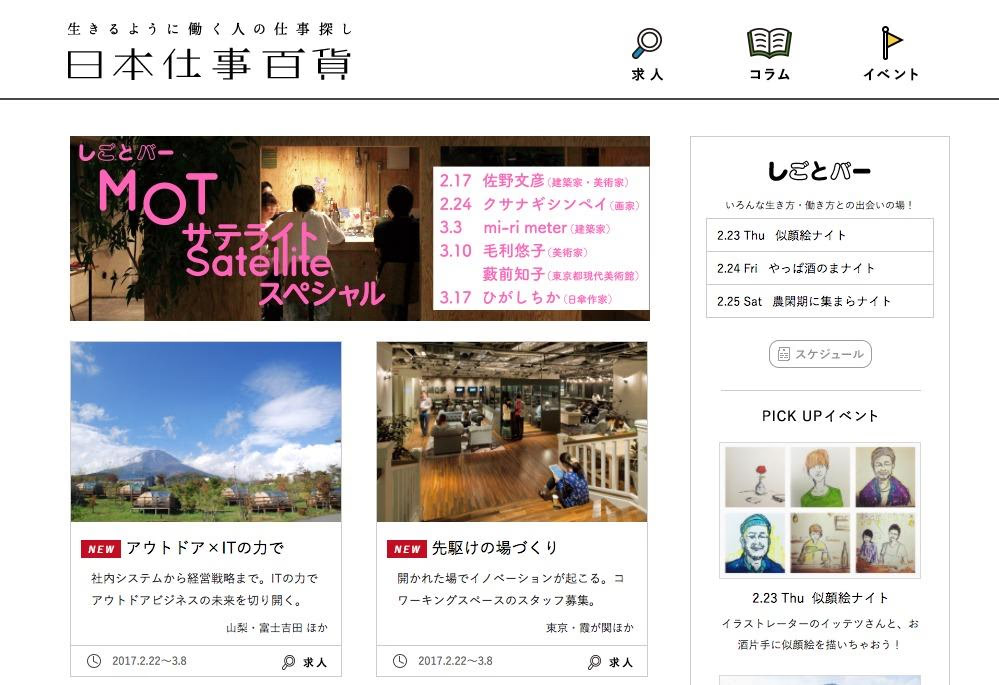
日本仕事百貨 http://shigoto100.com/
「一番大切にしているのはいつも読者です。 2 時間の取材の為に用意された場かもしれませんが、私たちはそこで感じたことをそのまま正直に書きます。それが結果的に、その会社に入る人にとっても、採用した側にとってもいいことだと思っています。
仮に提出した原稿に対しては、会社さんからたくさんの赤字が入っても、そのまま直すことはほぼありません。どうしても良く伝えたいという修正になってしまうので、突っぱねるという言い方は乱暴ですが、『これではいい採用にはつながりませんよ』と説明して、再考してもらっています」
通常、こうしたケースではクライアントの意向や要望が優先されるものですが……。
「日本仕事百貨はサイトの作りとして、検索機能がありません。つまり、自分が探している仕事だけを見ることができないんですよね。求人記事を読まないと何の求人かわからない。ですから、定期的に読んでくださる人たちは、転職したくて見るというよりは読み物として楽しんでいるわけです。
そして、自分がやってみることは考えてもいなかった仕事だけど、読んでみたら意外とおもしろそう。この人と働いてみたい。そんな動機から応募につながっていく。読者が応募者になるんです。だから、日本仕事百貨っぽさを大切にしながら、正直にライターが感じたことを優先し、赤字の言葉も仕事百貨らしく書き換えさせてもらいます、とお返事しています」
ヒアリング時に「感じたことをそのまま紹介させていただきます」と伝えてから始まる取材では、中嶋さんはこんなことを考えながら話を聞いているそうです。
「その組織が大切にしていることを聞きながら、『友達のあの子が入ったらいいな』といった人物像が浮かんだら終わりにしたいと思っています。私は、その方が書きやすいですし、採用にもつながりやすい。だから、仕事百貨は 1 個 1 個の記事の PV数を取っていないんですよ。いまどき、驚かれますよね。でも、その理由として、すごく読まれた記事がいい採用につながるわけではない気がしていて。
こういう人が欲しいと聞いて人物像をイメージしたら、その人が読みたい記事を書ければいい。例えば、取材で『根暗な人がいいんだよ』と言われたら、オブラートに包むんで当たり障りなく書き換えるんじゃなくて、根暗な人が読みたいタイトルをつけてしまいます。極端な話、読んだのが 1人だけでも、その 1人が応募して、採用につながればいいわけですから」
この姿勢は、まさにモノサスの求人記事にも反映されていました。
「その点、モノサスの取材では、林さんがけっこうはっきりと求めている人物像を伝えてくださるから、書きやすいですね。モノサス塾の1回目のときで言うと、『バカボンのパパ、これでいいのだ』って話をしてくれて。そのとき、私は林さん “すごくキュートな人なんだなー” と思って(笑)」
キュート!?
「ザ・マジメじゃなくて、すごくユニークなのもありにする人だと感じたから、応募する人たちがそういう林さんの感じをわからないと、入ってからつらいじゃないですか。だから、2 回目の神山ものさす塾のとき(の記事)かな。林さんが頬杖付いているかわいい写真を選んだんですよ」
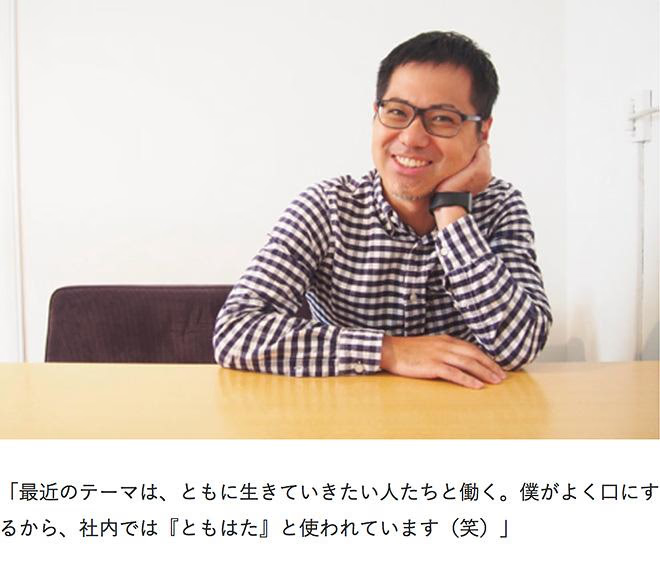
神山ものさす塾第2期の求人記事『ともに生きたい人と働く』に掲載された写真
話題に上っている写真、モノサス社内ではざわめきが起き、「神山の棚田の写真にしてください」とリクエストを出しました。ところが……。
「でも、取材中に『地域の街づくりがしたいって人に来て欲しいわけじゃないんです』と言われていて。棚田の写真だと田舎に移住したい系の人から応募が来るんだろうなと思ったから、それは違うかなって。むしろ、ちょっと不思議な雰囲気の林さんの写真をクリックする人が入った方がいいんじゃないかな、と思って突っぱねさせていただきました」
結果、中嶋さんの書いてくださった記事を読んで応募者は80名を超え、塾生同士が「なんで、こんなにいい人を選んでくれたんですか?」とお互いに言い合うくらいすばらしい塾生が集まりました。
仕事をする理由の1つは、
自分が健やかにあれる人たちとともにあるため
中嶋さんは、「ともはた」にも共感したと言ってくれました。
「『ともはた』の話は、私が日本仕事百貨や取手アートプロジェクトの仕事をしようと思った理由とも近いところがあるんじゃないかなと思っていて。この人たちと一緒に働いていたい。ここで仕事をしている人たちの距離感が好きというか。職場の人たちって毎日会うし、距離が近いじゃないですか。
これは私が人に影響されやすいからかもしれないけど、感覚や価値観も似てくるかなと思っていて。だから、“この先、私はどうなりたいか?” を考えるとき、イメージしている “どうなりたいか” に近い人たちの側にいた方がいいと思うんですよ。
別に、すごいたくさんの人と友だちになりたいわけじゃないんですけど、自分が健やかにあれる人たちと関係を続けていきたいなって。だから、林さんから『ともはた』のことを聞いたとき、『ああ、そうだなぁ』と感じたんです」
取材中、中嶋さんからは「別にライターになりたかったわけでもないし」「別に街づくりやアートに興味があったわけではないんだけど」など、「別に」で始まる言い回しが何度も出てきました。でもそれは後ろ向きな言葉ではなく、自分がいいなと思う人、いいなと思う界隈に飛び込む勇気を出すためのキーワードのようでした。
「私、基本面倒くさがりで、家でゆっくりしていたいんですよ(笑)。でも、働かなくちゃいけない。だったら、自分がいいなと思う方へ近づいていきたいじゃないですか。
例えば、取手でボランティアをしていたら、建築家で東京R不動産の仕掛け人である馬場正尊さんがその NPO にプロデューサーとして関わっていたんです。私は前の会社を辞めたいなと思っていたとき、西村佳哲さんの本(『みんな、どんなふうに働いて生きてゆくの?』弘文堂 2010年)で馬場さんが『血液みたいに動きまわる人』 と紹介されていて。それを読んだとき、おこがましいんですけど、“こういうことなら私もできるかも” ってすごい共感したんですよ。
本当に印象に残っていたので、そんな人と取手で関わることができて、今度、仕事百貨では馬場さんを知るきっかけとなった西村さんとご一緒することができた。ひょろひょろと好きな方へ近づいていったら、人生が本当に不思議な展開になっていて。人に会うってすごく大事だなと思うんです」
さらに、中嶋さんは「仕事をしているからこそ、たくさんの人と会うことができる」とも言います。
「林さんもそうですし、取材で話をお聞きする人たちは、私が仕事百貨で働いているから会える人たちです。『はじめまして中嶋希実です』と突撃しても話せる機会がない人でも、『仕事百貨の中嶋です』と言うと、話せる関係ができる。そういう関係を作ってくれるきっかけが、仕事であって。それはとても大事だなって思うんです」
私たちもまた仕事をきっかけにして中嶋さんと出会ったわけですが、モノサスは中嶋さんからどんなふうに見えているのでしょう。
「私、たぶん本業の方をよく知らないんですよね。暮らし方、働き方の部分ばっかり知っていて。でも、そういう部分を意識し始めた会社がたくさんある中で、モノサスさんはけっこうな勢いで本当に始めちゃう人たちだなって。
例えば、タイに行くみたいなことも、新しい実験としてじわじわ始めていく会社が多いし、『やっちゃおうぜ!』と言っているけど、実際にはできなかったりもするじゃないですか。でも、モノサスはタイも神山も農業も、『やっちゃおうぜ!』がちゃんと始まり、続いているのがすごいなって」
いっそ中嶋さんも「別に、ちょっと」という感じでご一緒に何かやってくれませんか?
「こんな格好でも大丈夫ですか。営業時代の服は全部、捨てちゃったので(笑)。ヒールも履けないですよ」
全然、大丈夫です。
「じゃあ、机を作っておいてもらったら(笑)」
自分で何かを始めた人たちの話を聞き、
私にもできるかな? と始めたもう1つの顔
ここまで読んできて、私も中嶋さんに会ってみたいな、話してみたいなと思った人に耳寄りなお知らせがあります。じつは、中嶋さんはもう1つ別の顔を持っているのです。
それはチャイ屋さん。『きみちゃい』というお店を月に1回、都内や茨城県で場所を借りて開店しています。
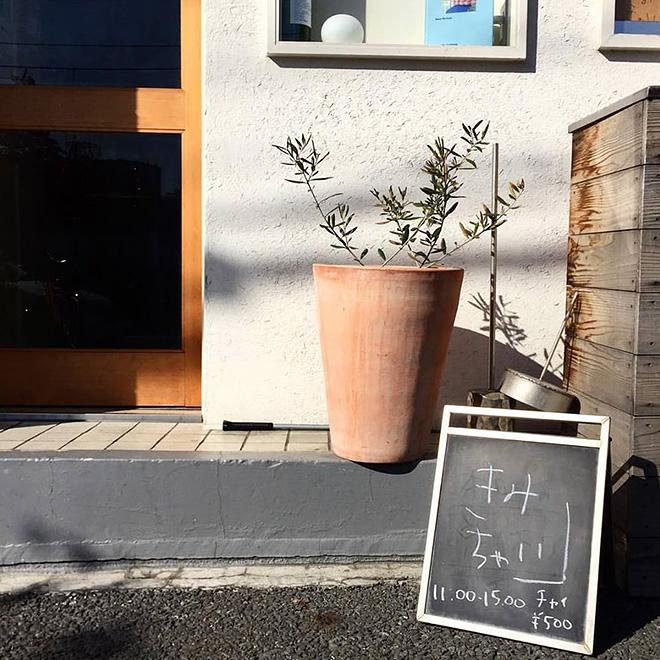
最新の “きみちゃい” 情報はこちら http://www.kimichai.com
Facebook https://www.facebook.com/kimiichaii/?fref=ts
「取材で経営者に会うじゃないですか。みんな、自分で何かを始めた人たちですよね。その人たちの話を聞いていると、『私も何かできるんじゃないかな?』 と思えてきたんですよ。想像していたよりも事業を始めてみることが、気軽なものというか、近いものに感じられたんですね。前の会社で働いていたときは、起業なんて自分とは全然関係ない話だと思っていたのに。
それと取手のNPOでプロジェクトを立ち上げる経験をしたことで、取材のときに相手に聞けること、わかる範囲が広がった感覚があって。もしかしたら、自分で何かを始めてみるとまた聞けること、わかることが増えるのかもしれないというか。でも、チャイ屋なんて経営でもなんでもなくて、 1ヶ月に 1回やっているだけですけどね(笑)」
なんでチャイ屋なんですか?
「お話したニートの時代、がんばって外に出るキャンペーン中に自由大学にも行ったんですよ。睡眠学っていうよくわからない講座に通ったんですけど、そこで出会った人がバングラデシュで学校を作るプロジェクトをやっていたんです。
別に、バングラデシュに行きたかったわけでじゃないんですけど、その人は海外経験が豊富だったので、『ニートになるし、旅行行こうかな』と言ったら、『バングラデシュ一緒に行く?』と誘ってくれて。それがきっかけで、向こうで学校を運営する任意団体のメンバーになりました。
もう学校はできていて、チャイ屋さんは運営資金を稼ぐためのお試し。別に、チャイがすごい好きだったわけじゃないんですけど。チャイなら作れそうな気がしたんです。あ、また『別に』が出ちゃいましたね(笑)」
インタビューを終えて 〜中嶋さんへの手紙〜
文中にも登場した、応募者80名超えとなった「神山ものさす塾」の募集記事。
そのときに取材を受けた一人が、事務局を担当したプロデュース部の岩木でした。そのご縁から今回のインタビューにも同席、おおいに盛り上がりました。
「中嶋さんの話、ホントに面白かった!」と振りかえる岩木から、中嶋さんへの感謝のメッセージで締めくくりたいと思います。
グイグイくるわけでもなく、淡々としてるわけでもなく、
時にウフフと笑いながら、時に立ち止まって問いかけながら、
その場で起こることを、じっくり楽しんでいるような…中嶋さんの取材スタイルは「取材している/されている」関係というよりは、
「いっしょに会話のキャッチボールを楽しんでいる」という感覚。スルスルと話してるうちに終わってしまうので、
え?これで終了?記事にできるの?とドキドキするんだけど、
完成した記事には「私たちの思い」がちゃーんと描かれている。どうしたらこんな風に書けるんだろう?
そんな疑問からはじまったインタビューは、まさかの「別に」の連続という意外な展開に(笑)。でも、なんというか、すごく等身大、自然体。
「この会社には友達のあの子が合う!と思って書く」なんて、シビアな転職市場のほにゃららとはまったく違う、地域の仲人さんみたいなノリというか。だからきっと、読む人の心にも正直に伝わるし、
私たちがいいなぁと思う人たちが、実際に来てくれるんだと思います。中嶋さん、いつもあったかい記事をありがとうございます。
これからもモノサスのこと、末永くよろしくお願いします!プロデュース部 岩木香織
